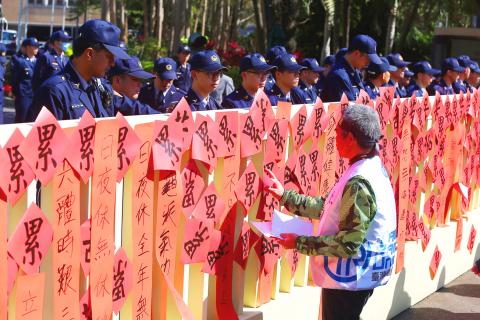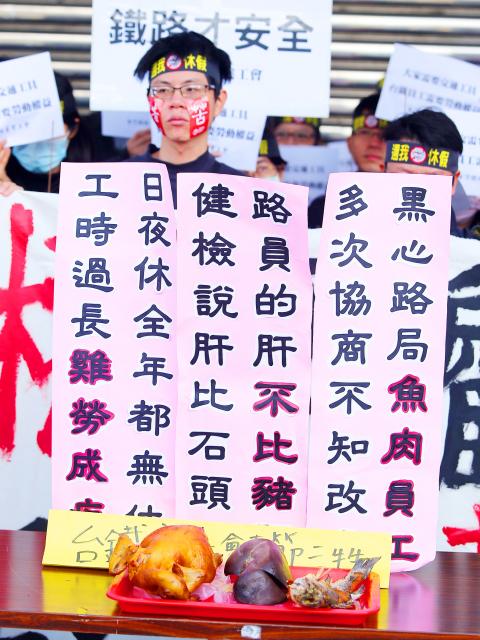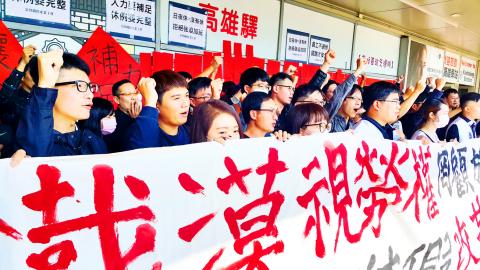Taiwan Railways Administration (TRA) employees yesterday protested at major train stations in Taipei and Kaohsiung, saying that they are being overworked, with the rallies timed to coincide with heavy passenger demand at the start of the Lunar New Year holiday.
About 200 members of Taiwan Railway Union launched their protest at the Taipei Railway Station at 11:30am, the same time 100 members began their rally at the Kaohsiung Railway Station.
The group in Taipei later moved over to the front of the Executive Yuan, where they posted “lucky” character signs and spring couples on a fence erected in front of the building, watched over by scores of police.

Photo: CNA
The protesters held up banners and slogans that said: “TRA violates workers’ rights, disregards passenger safety” and “Reform public transportation, give workers rights to have rest days.”
The protesters demanded that the state-run TRA follow recently promulgated amendments to the Labor Standards Act (勞動基準法).
They also said TRA’s management was forcing employees to work overtime during the Lunar New Year holiday, which would jeopardize passenger and transport safety.

Photo: CNA
“The railway’s management has violated employees’ labor rights. We have to work long hours and are not permitted to take days off as the law stipulates... We need to have proper rest to ensure safety standards for passengers are maintained,” Taiwan Railway Union executive Chou Kai (周鍇) said.
The union also accused the TRA of cutting the amount employees are paid for working overtime and refusing to hire more people to cope with the reduction in allowable work hours under the new five-day work week policy
More than 1,000 TRA employees last week signed a petition asking for time off for the long holiday, saying that it was their legal right to have time off from yesterday, Lunar New Year’s Eve, until the third day of the Lunar New Year on Monday.

Photo: Chen Wen-chan, Taipei Times.
With hundreds of union members taking leave en masse for the first time in the agency’s history, the company has added temporary staff, including young men doing their alternative military service.
Taipei Railway Station Master Huang Jung-hua (黃榮華) met with the protesters at the station, and he assured the public that train safety was not being jeopardized.
“We normally have 56 staff working each shift at the Taipei Railway Station. We had six workers taking today off, making it 50 people on the current shift,” Huang said. “There are three work shifts a day, with total of about 150 staff at work. So for the day, we might have a total of 20 people taking the day off. We can manage under this situation, and the rights of passengers to take the train home [for the holidays] will not be affected.”
The TRA has a pool of backup employees who can be called upon to provide extra support during the holiday, so most trains will run on schedule, although there might be minor delays, he said .

The US government has signed defense cooperation agreements with Japan and the Philippines to boost the deterrence capabilities of countries in the first island chain, a report by the National Security Bureau (NSB) showed. The main countries on the first island chain include the two nations and Taiwan. The bureau is to present the report at a meeting of the legislature’s Foreign Affairs and National Defense Committee tomorrow. The US military has deployed Typhon missile systems to Japan’s Yamaguchi Prefecture and Zambales province in the Philippines during their joint military exercises. It has also installed NMESIS anti-ship systems in Japan’s Okinawa

TRAGEDY STRIKES TAIPEI: The suspect died after falling off a building after he threw smoke grenades into Taipei Main Station and went on a killing spree in Zhongshan A 27-year-old suspect allegedly threw smoke grenades in Taipei Main Station and then proceeded to Zhongshan MRT Station in a random killing spree that resulted in the death of the suspect and two other civilians, and seven injured, including one in critical condition, as of press time last night. The suspect, identified as a man surnamed Chang Wen (張文), allegedly began the attack at Taipei Main Station, the Taipei Fire Department said, adding that it received a report at 5:24pm that smoke grenades had been thrown in the station. One man in his 50s was rushed to hospital after a cardiac arrest

‘WIN-WIN’: The Philippines, and central and eastern European countries are important potential drone cooperation partners, Minister of Foreign Affairs Lin Chia-lung said Minister of Foreign Affairs Lin Chia-lung (林佳龍) in an interview published yesterday confirmed that there are joint ventures between Taiwan and Poland in the drone industry. Lin made the remark in an exclusive interview with the Chinese-language Liberty Times (the Taipei Times’ sister paper). The government-backed Taiwan Excellence Drone International Business Opportunities Alliance and the Polish Chamber of Unmanned Systems on Wednesday last week signed a memorandum of understanding in Poland to develop a “non-China” supply chain for drones and work together on key technologies. Asked if Taiwan prioritized Poland among central and eastern European countries in drone collaboration, Lin

ON ALERT: Taiwan’s partners would issue warnings if China attempted to use Interpol to target Taiwanese, and the global body has mechanisms to prevent it, an official said China has stationed two to four people specializing in Taiwan affairs at its embassies in several democratic countries to monitor and harass Taiwanese, actions that the host nations would not tolerate, National Security Bureau (NSB) Director-General Tsai Ming-yen (蔡明彥) said yesterday. Tsai made the comments at a meeting of the legislature’s Foreign Affairs and National Defense Committee, which asked him and Minister of National Defense Wellington Koo (顧立雄) to report on potential conflicts in the Taiwan Strait and military preparedness. Democratic Progressive Party (DPP) Legislator Michelle Lin (林楚茵) expressed concern that Beijing has posted personnel from China’s Taiwan Affairs Office to its